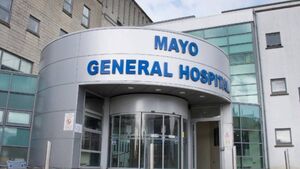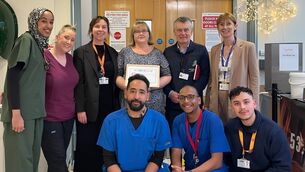Elderly Mayo woman (84) left waiting 22 hours for MUH bed

A Saolta hospital spokeswoman said MUH had extremely high patient attendances last week
The daughter of an 84 year-old North Mayo woman suffering from diabetes and a kidney infection who was left waiting 22 hours for a bed at Mayo University Hospital has called on the Government to take urgent action.
The woman contacted Independent Councillor Michael Kilcoyne to highlight and complain about the way her mother was treated and “not prioritised” in A&E last Wednesday evening and on Thursday.
The daughter of the pensioner, who will be 85 years old in July, explained her mum was treated by a doctor last week for a kidney infection.
The patient, who is still currently in hospital at MUH one week later, was left waiting 10 hours for a trolley overnight without sleep and a further 12 hours on a trolley before she was given a bed.
“She has recurrent infections, she is a diabetic and her kidney are starting to fail,” her daughter said. “My mother had bloods taken in Galway a few weeks ago and the hospital contacted her doctor on Wednesday, January 3rd to advise that her potassium levels were very high (6.5) and he rang her to advise that she needed to go into hospital straight away as it was very dangerous.”
The doctor advised the patient and her daughter he would fax or email in a letter containing her blood results which he received from Galway.
“My sister brought her up from [North Mayo] and they got there at 6.50pm. They were seen at the desk, but had no letter as the doctor was faxing it up,” she said. “The receptionist only took her name address and date of birth.”
The daughter of the patients said her sister tried to explain her mother’s medical history and what was wrong, but she was told to take a seat.
“They sat for four hours before they were even called in by the nurse, and in order to get called in my sister had to go to the receptionist a number of times as every one that came into A&E after them were being called to see the triage nurse before them,” she said. “A better system needs to be set up urgently to help with the way patients are called in and to prioritise the elderly and sick children.”
The daughter said she left a North Mayo area to go up with food, a blanket and cushion to my mother as she was “freezing and hungry” and her sister could not leave her in her own.
“The nurses are doing their best and are under extreme pressure we know and do feel for them,” she added.
The daughter of the patient said she was eventually called to the triage nurse at 11pm who took details, done a heart trace, and then told her to take a seat out in the waiting area again.
“Eventually at about 4.15pm on Thursday, January 4th she was called into the doctor,” she said. “The patients that had come into A&E after her on Wednesday night were all seen before her, and some of them were young patients. Why was she treated and left like this. She deserves better. “
The daughter outlined when her mother was called into the doctor she was put sitting on a seat and a cannula was inserted to take bloods.
“She was then left sitting on that chair until 8am this morning, when my sister finally went to beg for a trolley or bed for her as she was exhausted, upset and she was feeling faint,” she said. “My mother begged my sister to bring her home out of that place as she couldn't take it anymore. “ The daughter of the elderly patient stated when her sister went ‘begging’ for a trolley, she did eventually get one for her at that stage.
The woman spent more than 12-hours on the trolley, with no sleep and her daughter said her and her sister were taking turns staying with her to “ensure she will get looked after” in A&E.
“Granted A&E is very busy and the staff are under extreme pressure, but they have a printed leaflet there and on it they are supposed to be prioritising elderly people,” she said. “That was not the case last Wednesday night (January 3),” she added.
The frustrated and angry daughter stressed people younger than her mother, who came in hours after her, were fully seen to before she was.
“It's so wrong and demoralising for patients and families alike,” she said. “I was up there with her myself and I could see how busy it is, and the staff are trying their best.” The daughter explained all of the staff she has met have been very kind, helpful and accommodating.
“We meet OTs (occupational therapists), pharmacists, nurses, doctors, and porters, ambulance staff and kitchen staff, and each and every one of them were very nice and helpful,” she added.
However, the daughter said the way her mother was left and treated last Wednesday night was so ‘wrong and upsetting’.
“The TDs and Government need to urgently do something about this and sort out our health system,” she said. “We are very angry, annoyed and upset at the way she's been treated and hope this never happens again.” The Western People contacted the Saolta hospital group, which runs MUH and a spokeswoman who said they could not comment on individual cases admitted the facility is under severe pressure.
“Mayo University Hospital, like hospitals around the country is extremely challenged by a sustained increase in demand and a lack of available beds,” she said. “Last week was among the busiest in MUH in the previous eight months, the hospital had 25% higher than normal attendance on some days with many ICU admissions directly from the Emergency Department.” Castlebar-based Cllr Michael Kilcoyne insisted it is was an unacceptable way to treat a senior citizen who is now making some progress, but being on a trolley and a chair for so long did not help her.
“Elderly people should not be treated in that manner,” he said. “According to the Government and the Department (of Health) elderly people are supposed to get priority, but they are not getting it.” Cllr Kilcoyne disagreed that it was an extreme case and stated he believes this seems to be “normality at Mayo University Hospital”.
The Saolta hospital spokeswoman said these extremely high attendances put significant pressure on the hospital system and on staff.
“We apologise to any patient who experienced a long wait time in the ED,” she said. “Patient safety is at the forefront of everything we do and staff prioritise those to ensure critical need is met.” She said they regret that any patient has a bad experience while waiting to access their services including those who have to wait in the Emergency Department beyond an acceptable timeframe.
“In particular, we acknowledge that long waiting times are very difficult for older people and those who find themselves in vulnerable situations and we remain committed to trying to ensure that their care and comfort will be a priority even when some waiting is unavoidable,” the statement concluded.





